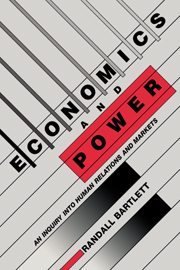Book contents
6 - Power and organizations
Published online by Cambridge University Press: 18 September 2009
Summary
The previous chapter opened with two quotes from Frederick Hayek on the problems of consolidating information from a multitude of sources. No system of coordinating human behavior into a coherent whole can proceed without mechanisms for gathering information on what is and dispersing information to others about what to do. Hayek and many others have concluded that the mechanism best able to do this is the market. Relative prices are summary statistics carrying an astonishing amount of information about market demands, costs, and technology. Indeed, the logic expressed in formal microtheory models leads to the unavoidable conclusion that markets are the most efficient means of structuring human effort. Decentralized decisions in response to these prices is proven to lead “as if by an invisible hand” to a socially optimal outcome.
That leaves a perplexing question, however. If markets are clearly better than all other alternatives, then why are they so little used? Most of the production in this world takes place under a system of administrative authority with hierarchical patterns of control. Goods may ultimately reach a market, but only after extended stays in organizations in which human behavior is coordinated by administration. This fact is often obscured in the specified drama of economic theory in which one important category of actors consists of business “firms,” usually discussed as if they were individual entrepreneurs.
- Type
- Chapter
- Information
- Economics and PowerAn Inquiry into Human Relations and Markets, pp. 102 - 120Publisher: Cambridge University PressPrint publication year: 1989



